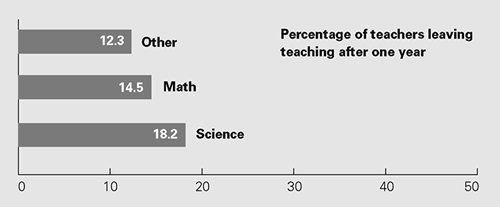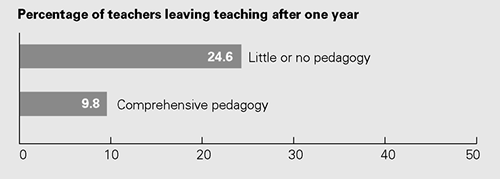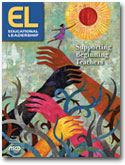The preparation of prospective teachers is one of the most contentious issues in education policy. Often, the debate centers on the relative value of teachers' subject-matter knowledge (knowing what to teach) and their pedagogical skill (knowing how to teach). The amount of preparation that a new teacher has received in each of these areas depends, to a certain extent, on the path that he or she has followed into teaching.
As more teachers come into teaching through nontraditional or alternative routes (currently more than 40 percent, according to our national data analyses), a growing body of research seeks to assess the value of these different entry routes. Typically, such research focuses on how various kinds of teacher education, preparation, or certification are related to student achievement.
Recently, we undertook a study of how preservice teacher preparation affects a different outcome: teacher retention. We asked, Do the kinds and amounts of education and preparation that new teachers receive before they begin teaching affect whether they remain in teaching?
Zeroing in on Mathematics and Science
In earlier research,<FOOTNOTE><NO>1</NO>Ingersoll, R., & Perda, D. (2010). Is the supply of mathematics and science teachers sufficient? American Educational Research Journal, 47(3), 563–594. Retrieved from University of Pennsylvania Graduate School of Education at http://aer.sagepub.com/content/47/3/563.full.pdf</FOOTNOTE> we have documented that early attrition from teaching is a major, but often overlooked, factor behind the much-heralded shortages of mathematics and science teachers. In turn, we have also investigated which aspects of schools, their working conditions, and their leadership are linked to mathematics and science teacher attrition.<FOOTNOTE><NO>2</NO>Ingersoll, R., & May, H. (2010). The magnitude, destinations and determinants of mathematics and science teacher turnover. Philadelphia: Consortium for Policy Research in Education, University of Pennsylvania. Retrieved from University of Pennsylvania Graduate School of Education atwww.gse.upenn.edu/pdf/rmi/MathSciTeacherTurnover.pdf</FOOTNOTE>
Our current study focuses on the effects of a wide variety of types of teacher preparation. How do the retention rates of teachers coming from traditional teacher education programs compare with those of teachers coming from alternative routes? Are new mathematics and science teachers with education degrees more likely or less likely to stay in the profession than those with degrees in mathematics or science? Do the amount of practice teaching and the extent of preparation in pedagogical methods have any bearing on retention?
With support from the National Science Foundation, we set out to answer these questions. Our data source was the National Center for Education Statistics' nationally representative 2003–04 Schools and Staffing Survey, along with its supplement, the 2004–05 Teacher Follow-up Survey. This is the largest and most comprehensive data source available on elementary and secondary teachers and schools.
We focused on teachers in their first year of teaching, when attrition is highest and when the effects of preservice preparation are perhaps most powerful. We looked at whether they stayed in teaching or left after their first year on the job. We defined mathematics and science teachers as those who had received an undergraduate or graduate degree in mathematics, in one of the sciences, or in related fields, such as engineering, mathematics education, or science education.
Our findings are striking: The preservice education and preparation of new mathematics and science teachers are strongly related to their retention—but it depends on which aspects of preparation we look at.
Differences in Teacher Preparation
The data show that the preparation of new mathematics and science teachers differs greatly from that of other teachers in a number of ways.
Education. Beginning mathematics teachers—and to an even greater extent, science teachers—are more likely to have received their bachelor's degrees from the most selective colleges and universities. In 2004, about 10 percent of all incoming teachers obtained their bachelor's degrees from such colleges and universities; in contrast, this was true for 14 percent of new mathematics teachers and 20 percent of new science teachers. Beginning mathematics and science teachers were also more likely than other new teachers to have earned a master's degree or a doctorate.
Compared with other new teachers, beginning mathematics teachers—and to an even greater extent, science teachers—were more likely to have obtained noneducation degrees (for example, in mathematics, biology, or chemistry) and less likely to hold education degrees (for example, in mathematics education or science education). Sixty-eight percent of new science teachers and 42 percent of new mathematics teachers had a noneducation academic degree, compared with 29 percent of all other new teachers.
Finally, beginning mathematics teachers, and again especially science teachers, were less likely to report that they came through a traditional teacher education program, and more likely to have entered teaching through an alternative program or to have simply undertaken individual courses on their own instead of entering through any formal program. (Alternative routes vary across states, but in general these are programs designed to expedite the transition of nonteachers into teaching, often by enabling them to begin teaching while concurrently undertaking program coursework and requirements.)
Pedagogical preparation. Besides their types of college, degree, and program, beginning mathematics and science teachers also differ in the pedagogical preparation they have acquired before entering teaching. In our study, we examined various kinds of pedagogical preparation: practice teaching; opportunities to observe others' classroom teaching; formal feedback on one's own teaching; and coursework in teaching methods and strategies, selection and use of instructional materials, and learning theory or child psychology.
Beginning science teachers—and to a lesser extent, mathematics teachers—tended to have undertaken less pedagogical preparation than other teachers. For instance, both mathematics and science teachers were less likely to have taken coursework in teaching methods and strategies. Mathematics and science teachers also had less practice teaching than other teachers before taking their first teaching job. Strikingly, more than 40 percent of new science teachers had no practice teaching at all, compared with 21 percent of other teachers. In addition, new science teachers, in particular, were less likely to have had coursework in how to select materials or in learning theory and child psychology. They had fewer opportunities to observe others' teaching or receive feedback on their own teaching.
How Preparation Affects Teacher Attrition
Do these variations in the types and amounts of education and preparation that new teachers receive make any difference in the teachers' likelihood of staying in teaching? The results of our study suggest that the answer is yes.
First, the data show that in 2004–05, first-year mathematics and science teachers left teaching at higher rates than other new teachers: After their first year, more than 18 percent of science teachers left, 14.5 percent of mathematics teachers left, and 12.3 percent of other teachers did so (see fig. 1). In addition, our advanced statistical analyses show that, after controlling for the background characteristics of both the teachers and their schools, beginning teachers' education and preparation were significantly associated with their attrition. It depends, however, on which factors we look at.
Figure 1. Attrition of First-Year Teachers by Field, 2004–05

Contrary to widely held beliefs, we found that the type of college, degree, and preparation route had little bearing on teachers' likelihood of leaving teaching after one year. Teachers who attended more selective undergraduate institutions were not significantly more or less likely to return for a second year of teaching. The attrition rates of beginning mathematics and science teachers who held an education degree, such as in mathematics education or science education, did not differ from those of teachers with a noneducation degree. Those who entered through a traditional program were only slightly less likely to leave than those who entered through an alternative route.
However, the opposite was true for the amount and type of pedagogical preparation that new teachers had received: Pedagogy was strongly related to teacher attrition. Beginning teachers who had taken more courses in teaching methods and strategies, learning theory or child psychology, or materials selection were significantly less likely to depart. The amount of practice teaching they had undertaken, their opportunities to observe other teachers, and the amount of feedback they had received on their teaching were also significantly related to whether new teachers remained in teaching.
Of course, these types of pedagogical preparation are not independent components; they tend to come in packages. How much pedagogical background new teachers have acquired is partly a factor of the program or route by which they entered teaching—for instance, through a traditional or alternative route. But we also found large variations in pedagogical preparation both within and between these routes.
To more accurately distinguish among teachers according to their pedagogical preparation, we used a statistical clustering technique to empirically divide beginning teachers into groups receiving distinctly different packages of pedagogical preparation. At one extreme was a group who received little or no pedagogy—those who had at most one methods course; little or no practice teaching; and little or no materials selection preparation, learning theory or psychology courses, observation of others, or teaching feedback. At the other extreme was a group who receivedcomprehensive pedagogy—those entering teaching with a number of methods courses, materials selection preparation, learning theory and psychology courses, usually a full semester of practice teaching, observation of others, and feedback on their teaching.
Consistent with the earlier data, compared with other teachers, beginning mathematics and science teachers were less likely to have undertaken the comprehensive pedagogical package (23 percent of both mathematics and science teachers; 31 percent of other teachers) and more likely to have gotten little or no pedagogical training (20 percent of mathematics teachers, 26 percent of science teachers, and just 13 percent of other teachers). And the package the new teachers received had a very large collective effect on their attrition: Those receiving little or no pedagogy were more than twice as likely to leave after one year as those who received a comprehensive pedagogy package (see fig. 2).
Figure 2. Attrition of First-Year Teachers by Pedagogical Preparation, 2004–05

Pedagogy Matters
Some turnover of mathematics and science teachers is, of course, normal, inevitable, and even beneficial. Some new teachers leave the classroom because they discover that teaching is not right for them. Others leave classroom teaching to pursue administrative positions or other education-related roles.
However, none of these departures are cost-free. All of them result in a decrease in classroom mathematics and science teachers in a particular school—teachers who usually must be replaced. If we want to ensure that all students are taught by qualified mathematics and science teachers, retention is an important concern.
The study described here suggests that some features of teacher education and preparation have a strong bearing on retention of new teachers. Most striking, those who have received more pedagogical training are far more likely to stay in teaching after their first year.
Unfortunately, the kind of preparation associated with better retention is the kind of preparation that new mathematics and science teachers are less likely to have received. This finding has important implications for policy. Although it is important for teachers to have strong subject-matter knowledge, our data suggest that adequate preparation in pedagogical methods and skills—the how of teaching—is also important. And in that area of preparation, mathematics and especially science teachers are at a disadvantage.

